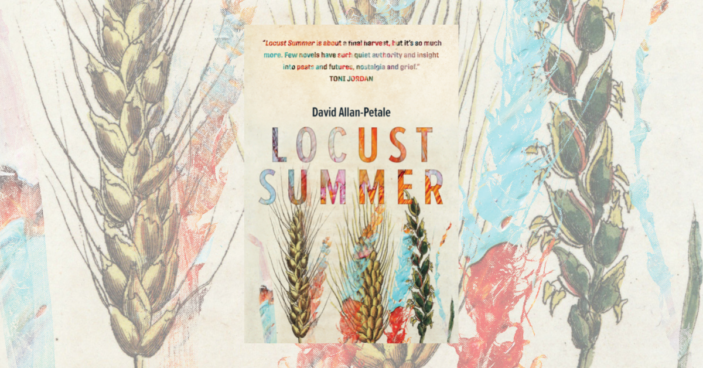
Locust Summer, the debut novel by WA writer David Allan-Petale, has been a long time coming. Shortlisted for the 2017 Australian/Vogel Literary Award administered by Allen and Unwin, the book was released this July by Fremantle Press in the midst of Perth’s latest lockdown. The postponement of a book launch due to circumstances beyond the author’s control, I think, would be a situation that the novel’s protagonist could appreciate.
Rowan Brockman is a young journalist on the police beat. As the book opens, he is on a ridealong with two plainclothes officers in Northbridge as the summer of 1986 gets under way. Rowan has worked hard to escape the farming town where he grew up, but when his mother phones and asks him to come home to help with the final harvest, he has no choice but to agree.
Rowan’s father, Bryce, is in the final throes of dementia and is no longer capable of running the harvest; and his older brother, Albert (the natural heir to the farm), died in an accident years before. Now, his mother has made the decision to sell the farm and move on. Rowan has been called in for the final harvest. In returning, he is forced to confront the reality of his family’s situation, and the consequences of his decision not to continue in the family business.
Allan-Petale’s writing is that perfect blend between a journalist’s unemotional assessment and a poet’s flair. He evokes the land and its people without being overly sentimental, allowing the reader to bring some of their own nostalgia to bear on the work.
While much of the novel is about fathers and sons, it is the relationship between Rowan and his mother, Justine, which stands out among the blokey farm rituals of work, smoko and pub. On his return home, Rowan begins to see his mother not only as the hardworking wife of a man in decline, but as a woman who had other hopes and dreams which she gave up to be a farmer’s wife. The pair find common ground both through their complicated love for Bryce (both as he was and as he is now in his illness) and also in the fact that neither of them was ‘meant to be’ living in Septimus or growing wheat but have found themselves there anyway.
Likewise, Allan-Petale’s handling of Bryce’s illness is sensitively done. He draws a complex and dignified picture of Bryce which is far more than just a plot device intended to emotionally manipulate the reader. Through a mix of tender present-day scenes and memories, Allan-Petale allows the reader to experience the bittersweetness of grieving someone before they are gone.
Less is more, or so they say, and it’s certainly true of this book. With true journalistic precision, Locust Summer gives the reader just enough, and gets to the emotional heart of its story quickly and with great impact. While we tend to think of West Australian fiction as being all about beaches, this novel is powerfully West Australian in its sense of nostalgia and its exploration of familiar (but none the less relevant) themes. Its publication marks the arrival of a new voice in the Australian literary fiction canon, and I would not be surprised to see this writer on prize longlists in the future.




![]()
FIVE STARS (OUT OF FIVE)
Locust Summer is available now through Fremantle Press. Grab yourself a copy from Booktopia HERE.
